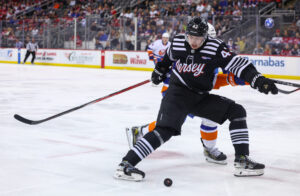Welcome back to the Last Word on Hockey’s summer series where we look at the biggest game in team history. Each day we will be back with a new team to look at. Looking at things like the lead-up, what happened, followed, and why it makes it the biggest game. The biggest game does not automatically mean a win, either. Sometimes, it can be a loss that set the franchise back massively. Sit back and enjoy as we break down all 31 team’s most important game. This is the New York Islanders biggest game in franchise history. The full series is found here.
New York Islanders Biggest Game in Franchise History
The New York Islanders were founded in 1972 as part of the NHL’s maneuvers to keep a team from the rival league the World Hockey Association (WHA). In February of 1972, Bill Torrey, then executive vice president of the NHL’s California Golden Seals, was named as the team’s general manager. His job was to construct the Islanders in order to compete with the teams already established in the NHL. Through the 1972 Expansion Draft, the Islanders secured forward Ed Westfall, defenseman Gerry Hart, and goaltender Billy Smith. The Islanders would pick up Bob Nystrom in the 1972 Amateur Draft. Nystrom would play a crucial role in the team’s success later on.
Like most expansion teams, the Islanders would struggle in the first few years of existence. However, Torrey believed in building through the draft and felt pursuing a “win-now” strategy did not make sense in the long run. As the Islanders struggles continued, the team wavered from their plan of building through the draft. The Islanders selected defenceman Denis Potvin first overall in the 1973 NHL Draft.
Things would soon turn the Islanders way. First, Torrey convinced Al Arbour to come over from the St. Louis Blues to coach the Islanders. Following in the 1977 NHL Amateur Draft, Torrey had the 15th pick and selected Mike Bossy with input from Arbour. This turned out to be a wise decision as Bossy became one of the league’s elite goal scorers in his first season. In that year, Bossy scored a then-NHL record 53 goals as a rookie.
Playoff Failures
The Islanders would find success early on in the Stanley Cup Playoffs. During the 1974-75 season, the Islanders defeated the New York Rangers, and Pittsburgh Penguins, before falling to the defending Stanley Cup Champion Philadelphia Flyers in the Wales Conference Final. In that run, the Islanders trailed Pittsburgh three games to none in a best-of-seven series against the Penguins. The Islanders rallied to win the next four games, to become the second team at the time to accomplish the feat. They were not as lucky in the next round having to rally again from another 3-0 deficit before falling to the Flyers in Game 7.
Despite the Islanders deep run in the playoffs in the 1974-75 season, the next few seasons brought heartbreak in the playoffs. Even with Torrey and Arbour leading the charge, the team could not get over the hump in the Stanley Cup Playoffs. After monster regular seasons in 1976 and 1977, the Islanders were knocked out in the semi-finals by the eventual Stanley Cup champion Montreal Canadiens. The next two years saw similar outcomes as the Islanders fell to the Toronto Maple Leafs in 1978 and the Rangers in 1979.
Morale was low as the Islanders could not get across the finish line despite having the best record in the NHL. Something needed to change. Arbour decided to concentrate more on the team’s energy instead of worrying about having the best record. He wanted his team to be focused in on the playoffs.
Overcoming Playoff Failures
As the old saying goes, a team first has to learn how to lose before they can win. For the Islanders, it was going through all the heartbreak that led up to the 1980 Stanley Cup Playoffs. Entering 1980, Torrey knew his team underachieved in the playoffs and needed something more to get over the hump. Torrey decided to trade popular Billy Harris and Dave Lewis to the Los Angeles Kings in return for Butch Goring.
Goring is often called the “final piece of the puzzle.” He was a strong two-way player, and his presence would ensure that opponents could no longer focus their defensive efforts on the Islanders top line of Bossy, Bryan Trottier, and Clark Gillies. The Islanders would get contributions from newcomers in wingers Duane Sutter and Anders Kallur. Not to mention stay-at-home defencemen Dave Langevin, Gord Lane, and Ken Morrow, who was fresh off a gold medal win at the 1980 Olympics. Morrow would be an integral piece to the Islanders success.
Success Was Coming
Everything was in place for the Islanders to have success in the playoffs. As the Islanders marched into the playoffs, their first opponent would be the Los Angles Kings. The Islanders took care of business winning the series in four games. However, their next opponent would be much tougher. In the second round, the Islanders faced the Boston Bruins, a more formidable opponent. The Islanders needed five games to defeat the Bruins as the Islanders were back in the Semi-Finals.
They faced the Buffalo Sabres, who finished second overall in the standings that season. The Islanders won the first three games before the Sabres rallied to force a Game 6. There the Islanders dominated the Sabres on home ice in a decisive 5-2 victory as the team reached the Stanley Cup Final for the first time in franchise history.
The Dynasty Begins
The Islanders faced a familiar foe in the Stanley Cup Final. Their opponent in the 1980 Stanley Cup Final was the Philadelphia Flyers, who were the regular season champions that season. Game 1 would go to the Islanders by a score of 4-3 on an overtime goal by Denis Potvin. The Flyers would even the series with a dominating score of 8-3 in Game 2 of the series. As the series shifted back to Long Island, the Islanders knew they had home-ice advantage.
The Islanders would win Games 3 and 4 on home to take a 3-1 series lead going back to Philadelphia with a chance to win the Stanley Cup. The Flyers showed what kind of team they had by forcing a Game 6 back on Long Island after a 6-3 win in Game 5. The stage was set for the Islanders to win on home ice.
Must Win
As the Islanders returned to Nassau Coliseum on May 24, 1980, they knew that Game 6 was a must-win and would turn the fortunes of this franchise. With the Stanley Cup in the building, the Islanders fell behind early. Trailing 1-0, Denis Potvin tied the game at 1-1 on the power play. With the game tied at 1-1, controversy-filled the Coliseum. Butch Goring gave the Islanders a 2-1 lead on a controversial goal that was offside. Even though momentum was on the side of the Islanders, the Flyers tied the game at 2-2 as the first period ended.
Coming out for the start of the second period, the Islanders built a 4-2 lead thanks to goals from Mike Bossy and Bobby Nystrom. It appeared the Islanders finally understood what it took to win in the playoffs. Even though it was the second period, fans were starting to believe this team could win. The lead was short-lived however as the Flyers rallied in the third period to tie the game at 4-4. Many started to question could the Islanders really win or did their past demons finally catch up to them?
The Decisive Playi
Inside the locker room, the Islanders were a confident bunch and did not let this swing in momentum scare them. They knew what they had to do when the doors opened for the start of overtime. The Islanders controlled the play in overtime. It was around the seven-minute mark of the first overtime where history changed for the Islanders. The series-winning overtime goal in Game 6 happened when Lorne Henning sent a pass up through the neutral zone to John Tonelli. Tonelli forwarded a cross-ice feed to Nystrom, who redirected it past Pete Peeters‘ blocker to give the Islanders their first Stanley Cup Championship in franchise history!
Aftermath
From that point on the Islanders would establish a dynasty like no other. The Islanders would win four consecutive Stanley Cups along with 19 consecutive playoff series. That feat may never be broken. The dynasty of the Islanders ran from 1980 through 1984. The Islanders found some success after losing to the Edmonton Oilers in the 1984 Stanley Cup Final. Despite still having the same team, the Islanders could not make a deep run in the playoffs. They lost to the Flyers in the Patrick Division Finals in 1985 and 1987. The Washington Capitals swept the Islanders in 1986 marking the first time since 1978 the Islanders lost in the first round.
From those great teams, the Islanders had seven members inducted into the Hockey Hall of Fame. They include head coach Al Arbour, players Mike Bossy, Clark Gillies, Denis Potvin, Billy Smith, General Manager Bill Torrey, and Bryan Trottier. After constructing four championship-winning teams Torrey would get the nickname “The Architect.”






